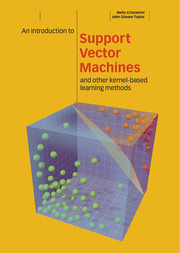Book contents
- Frontmatter
- Contents
- Preface
- Notation
- 1 The Learning Methodology
- 2 Linear Learning Machines
- 3 Kernel-Induced Feature Spaces
- 4 Generalisation Theory
- 5 Optimisation Theory
- 6 Support Vector Machines
- 7 Implementation Techniques
- 8 Applications of Support Vector Machines
- A Pseudocode for the SMO Algorithm
- B Background Mathematics
- References
- Index
5 - Optimisation Theory
Published online by Cambridge University Press: 05 March 2013
- Frontmatter
- Contents
- Preface
- Notation
- 1 The Learning Methodology
- 2 Linear Learning Machines
- 3 Kernel-Induced Feature Spaces
- 4 Generalisation Theory
- 5 Optimisation Theory
- 6 Support Vector Machines
- 7 Implementation Techniques
- 8 Applications of Support Vector Machines
- A Pseudocode for the SMO Algorithm
- B Background Mathematics
- References
- Index
Summary
All of the inductive strategies presented in Chapter 4 have a similar form. The hypothesis function should be chosen to minimise (or maximise) a certain functional. In the case of linear learning machines (LLMs), this amounts to finding a vector of parameters that minimises (or maximises) a certain cost function, typically subject to some constraints. Optimisation theory is the branch of mathematics concerned with characterising the solutions of classes of such problems, and developing effective algorithms for finding them. The machine learning problem has therefore been converted into a form that can be analysed within the framework of optimisation theory.
Depending on the specific cost function and on the nature of the constraints, we can distinguish a number of classes of optimisation problems that are well understood and for which efficient solution strategies exist. In this chapter we will describe some of the results that apply to cases in which the cost function is a convex quadratic function, while the constraints are linear. This class of optimization problems are called convex quadratic programmes, and it is this class that proves adequate for the task of training SVMs.
Optimisation theory will not only provide us with algorithmic techniques, but also define the necessary and sufficient conditions for a given function to be a solution. An example of this is provided by the theory of duality, which will provide us with a natural interpretation of the dual representation of LLMs presented in the previous chapters. Furthermore, a deeper understanding of the mathematical structure of solutions will inspire many specific algorithmic heuristics and implementation techniques described in Chapter 7.
- Type
- Chapter
- Information
- Publisher: Cambridge University PressPrint publication year: 2000



